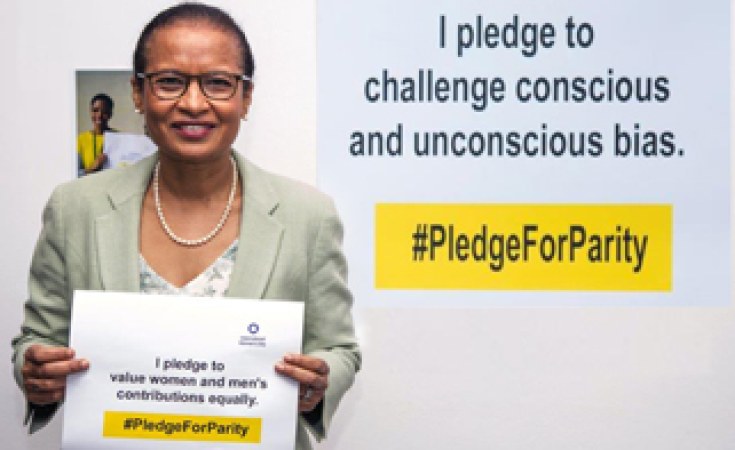The African Development Bank (AfDB) has launched a partnership with Facebook, the Kenya ICT Authority, Judiciary and the Kenya Police to increase awareness on cyber-based gender violence.
The event, which took place in Nairobi, Kenya, on Tuesday, March 8, 2016, was part of the Bank's activities to mark International Women's Day. The Bank was represented by AfDB's Special Envoy on Gender, Geraldine Fraser-Moleketi, and the Regional Director for East Africa, Gabriel Negatu.
The partnership will build capacity of the Kenya Police and Judiciary to handle gender-based cyber violence. The initiative recognizes that online violence against women and girls is rampant in Kenya as in many parts of Africa, but is not being addressed adequately, especially due to lack of data. "This is a new area. When we look at cyberspace, it is not something we can say there has been adequate data gathered on. But what we have seen is more cases of women being harassed," said Fraser-Moleketi.
The 2014 Kenya Demographic Health Survey indicates that 41 % of women aged between 15-49 years have experienced violence. While cyber violence was not captured as a form of violence under the indicators of the KDHS, cyber violence against women and girls if taken into account could significantly increase this figure, says the United Nations.
Fraser-Moleketi added that while ICT had been used positively to achieve development, even improving access in financial services sector, it had also been used as a medium for cyber bullying and harassment, where people's personal spaces are being violated. Cyber-stalking, hate speech, wrong use of personal information, all on the increase in Africa, constitute abuse of technology. They have created a platform where women and girls on the continent feel marginalized and threatened based on their gender, experts say.
The increase in viral rape videos, for example, has become particularly commonplace in South Africa, adding to forms of gender-based cyber violence, according to the Institute of Security Studies.
Some African countries including Uganda and the Republic of Congo are reportedly taking measures to improve regulatory frameworks and strengthen the use technology to respond to the growing concern of digital gender-based violence.
The new partnership launched to fight cyber violence in Kenya seeks to empower police and judiciary on how to handle cybercrimes; reprimanding perpetrators and protecting victims, drawing from existing and new legislation. "Sanctions must include supporting justice for victims and prosecuting offenders including supporting consistency in clamping down on users who, through cyberspace, perpetuate violence against women and girls," said Zebib Kavuma, UN Women Kenya Country Director.
The launch was preceded by a panel discussion on "Women at the Forefront of Development: The Fight against Cyber-Based Violence". The importance of creating awareness of standards that govern how online spaces should be utilized emerged as key in stemming cyber violence. "We need to do better at raising awareness and informing people of the resources we have. We need to partner with each other and empower populations," noted Akua Gyekye, Facebook's Public Policy Manager for Africa.
The African Development Bank reiterated its commitment to support the government to ensure the new initiative that seeks to fight cybercrime in Kenya succeeds in its mandate. "Through our programs, we will boost measures that counter cybercrime in order to protect women rights in the cyber world," said Negatu.



